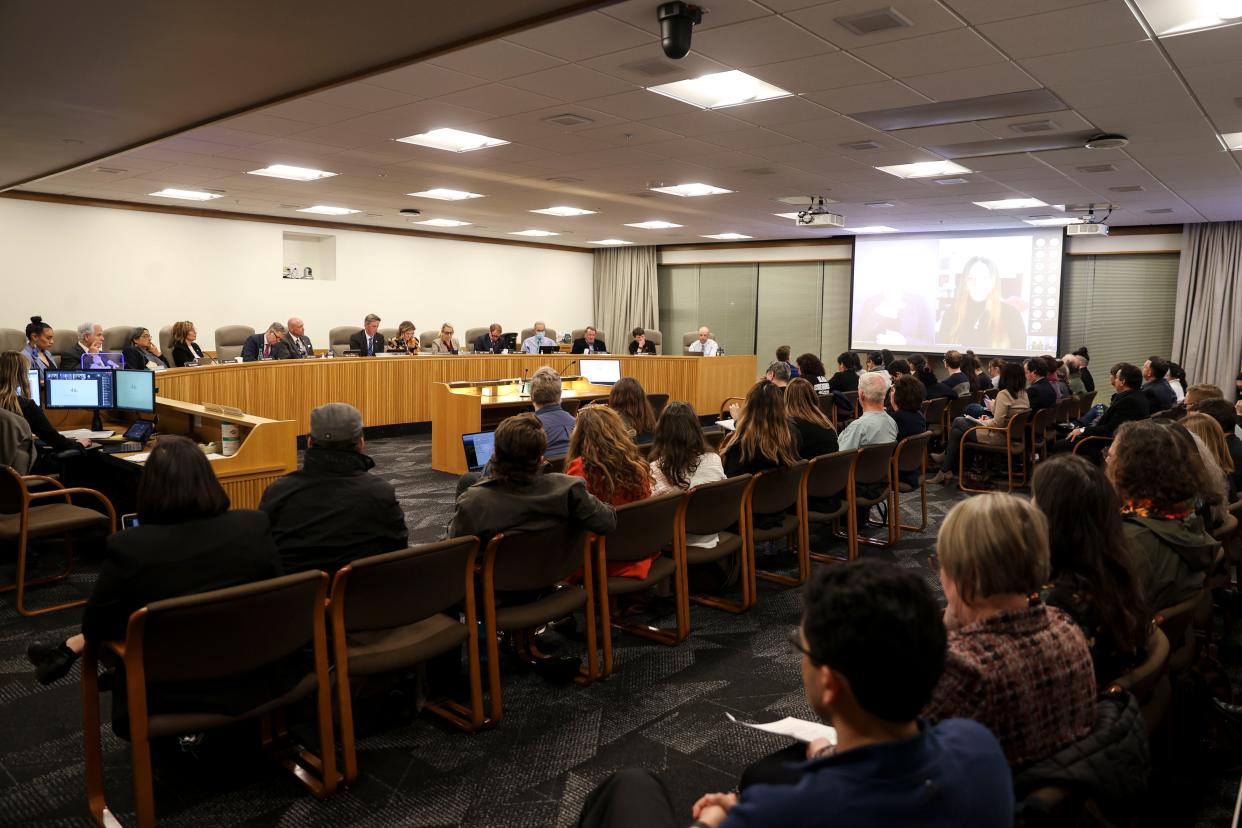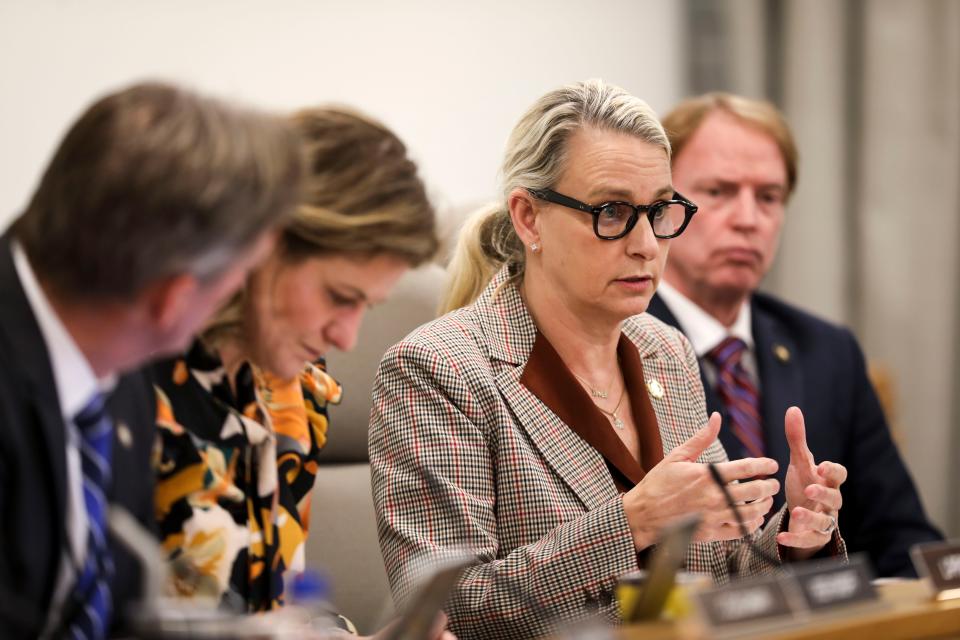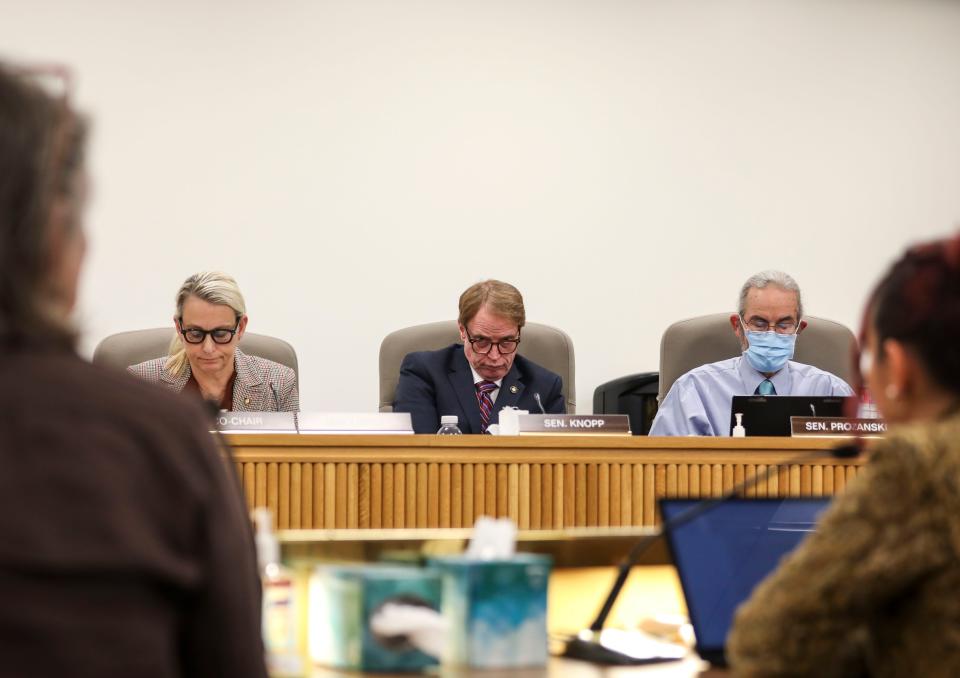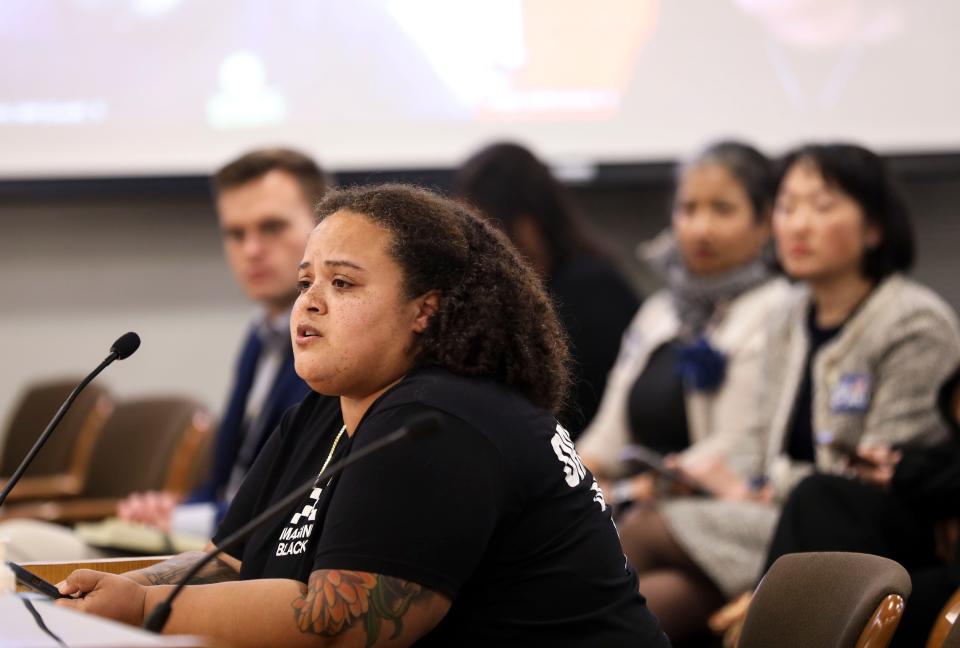Public packs legislative hearing on 3 bills that would roll back Measure 110

- Oops!Something went wrong.Please try again later.
Oregon lawmakers listened to public testimony Wednesday night during a four-hour, packed hearing on three proposals that all recriminalize possession of small amounts of drugs.
Hundreds of people submitted testimony online, largely in opposition of the bills that walk back key features of Measure 110, a first in the nation ballot measure decriminalizing illicit drugs that was approved by voters in 2020. Dozens more attended in person to share their views.
Sen. Kate Lieber, D-Portland, co-chair of a committee charged with addressing Oregon’s drug crisis of public drug use and a surge of fentanyl overdose deaths, made brief remarks before the hearing, acknowledging lack of consensus on specific solutions.
“There is no one thing that we do that is going to immediately fix what is happening on these streets,” Lieber said.
Key differences in legislation to recriminalize possession of controlled substances
House Bill 4002 sponsored by Democrats and Senate Bill 1555 and House Bill 4036 sponsored by Republicans all would repeal Class E violations introduced by Measure 110 that made possession of small amounts of small amounts of controlled substances punishable by a $100 fine. The fine can be waived if the person contacts a substance use helpline that also was established by Measure 110.
Each proposal has key differences.
HB 4002 would make possession of a controlled substance a Class C misdemeanor, punishable by 30 days in jail, a $1,250 fine, or both. Cited individuals would be offered a deflection program and the misdemeanor would be dismissed upon completion. Law enforcement would then notify the district attorney who would seal records in the case within 60 days. Records of a citation would be sealed within two years regardless of a conviction. Class C possession convictions would be sealed three years afterward.
The bill also creates sentencing enhancements for the delivery of controlled substances within 500 feet of a treatment center, shelter, or in a public park.
HB 4036 would make possession a Class A misdemeanor punishable by 364 days in jail, a $6,250 fine or both. If the charged individual completed a treatment program or evaluation, the conviction could be expunged from court records. Repeat offenders with past delivery or manufacturing charges would face an additional 36 months in jail.
The legislation would redirect Measure 110 funding to the Alcohol and Drug Policy Commission for grants to behavioral health resource networks. The Measure 110-created Oversight and Accountability Council responsibilities would be transferred to the commission.
SB 1555 is nearly identical to HB 4036, but it does not include a Class A misdemeanor for using in an "enclosed space" that's open to the public.

Measure 110 created 'live and let live' culture of drug use
Republican legislators, law enforcement officers and others all spoke in support of harsher penalties and referred to Measure 110 as a failure in need of repeal.
"My Republican colleagues are united in our belief that Oregon deserves better than the status quo," said House Republican Leader Rep. Jeff Helfrich, R-Hood River.
Rep. Tracy Cramer, R-Gervais, said allowing people to use drugs without seeking treatment was "cruel."
Michelle Stroh, an Oregon City School District board member, spoke of her son, Keaton, a 25-year-old Marine, who died of a fentanyl overdose in 2020 before Measure 110 was enacted.
Stroh said Measure 110 created a "live and let live” culture of drug use. "But for Keaton and many others, Measure 110 means 'live and let die," she said.
The 30 days allowed "is simply not enough time to save anyone" struggling with addiction, Stroh said.
The deflection program in HB4002 is "another experiment," said Max Williams, an attorney, former legislator, former director of the Oregon Department of Corrections and former chief executive officer of the Oregon Community Foundation.
If legislative fixes to Measure 110 do not happen, "we will be asked to take it to the people in November," said Williams, who spoke on behalf of the Coalition to Fix and Improve Ballot Measure 110 which has raised money to submit changes to Measure 110 on November's ballot.

Public defenders raise alarm about recriminalization
Public defenders cautioned lawmakers about returning to criminalizing possession.
The Oregon Public Defense Commission has not taken an official position on the bills, but commission chair Jennifer Nash said all three proposals would impact the public defense system grappling with its own crisis.
Nearly 3,000 people in Oregon are currently unrepresented as the state faces a shortage of public defense attorneys.
“If legislation is passed that creates criminal consequences for drug use there should be opportunities for early intervention, including deflection, from the system,” Nash said. “There is no current capacity in our public defense system to provide these people with lawyers. Those defendants would likely be placed on the unrepresented persons list.”
She said the commission estimates it would take 18 to 36 months to resolve cases in the current system.
Criminal defense attorney Rachel Phillips said recriminalization would flood an “already overwhelmed” criminal justice system.
Defense attorney Josh Hunking agreed the criminal justice system doesn't have the resources to handle more cases. His law firm, he said, has successfully gotten “dozens” of criminal cases dismissed in the last year because of the system being overburdened.
“If you don't invest in the criminal justice system it doesn't matter what you make a crime,” Hunking said.

Advocates protest 'return on war on drugs'
Several representatives of organizations across the state, including the Oregonians for Safety and Recovery coalition which advocates in favor of Measure 110, asked lawmakers to stay the course.
Sandy Chung, executive director of the ACLU of Oregon, said HB4002 was "political theater" and a diversion of tax dollars from "real solutions."
"HB 4002 is a massive failure of leadership by Democratic and Republican legislators who are leaning into fear-mongering, jails, and prisons instead of leading with the courage, care, and real solutions that Oregonians deserve and need," Chung said.
Speakers said lawmakers were returning to a "war on drugs" that had failed to yield results over the past 50 years.
Jonathan Frochtzwajg, with the Cascades AIDS project, said criminalization acts as a barrier to health services. He cited an analysis published in the medical journal The Lancet that "consistently showed clear patterns of criminalization having negative effects on HIV prevention and treatment."
Joe Bazeghi, director of engagement for Recovery Works NW said "no schema of criminal sanctions" would facilitate treatment" and referred to the bills as "backsliding."
Other advocates called for continued expansion of treatment.
"HB 4002 puts people in jail, not in treatment. Instead of handcuffs, people need more detox, more supported and recovery housing, more rapid response on our streets with outreach workers trained to get people into care,” said Tera Hurst, Executive Director of Health Justice Recovery Alliance. “If the legislature would focus on proven strategies that work, providers, law enforcement, and stakeholders could come together in partnership and more people would get the help they need.”
Measure 110 helped expand client capacity, said Basilio Sandoval with Plaza de Nuestra Comunidad, a nonprofit based in Lane County that provides services including mental health resources, translation services, human services, and substance use treatment for the Latino and immigrant community.
"Criminalizing people that are struggling with substance use disorders is not the answer to the overdose crisis we are facing," Sandoval said.
What's next for recriminalization proposals?
The Joint Committee on Addiction and Community Safety Response has regularly scheduled meetings on Mondays and Wednesdays at 5 p.m.
Agendas for next week have not been posted yet.
Written testimony on any of the bills will be accepted before 5 p.m. on Friday. To submit online testimony visit the Oregon Legislature website.
Dianne Lugo covers the Oregon Legislature and equity issues. Reach her at dlugo@statesmanjournal.com or on Twitter @DianneLugo
This article originally appeared on Salem Statesman Journal: Oregon Legislature hearing on 3 drug recriminalization proposals

